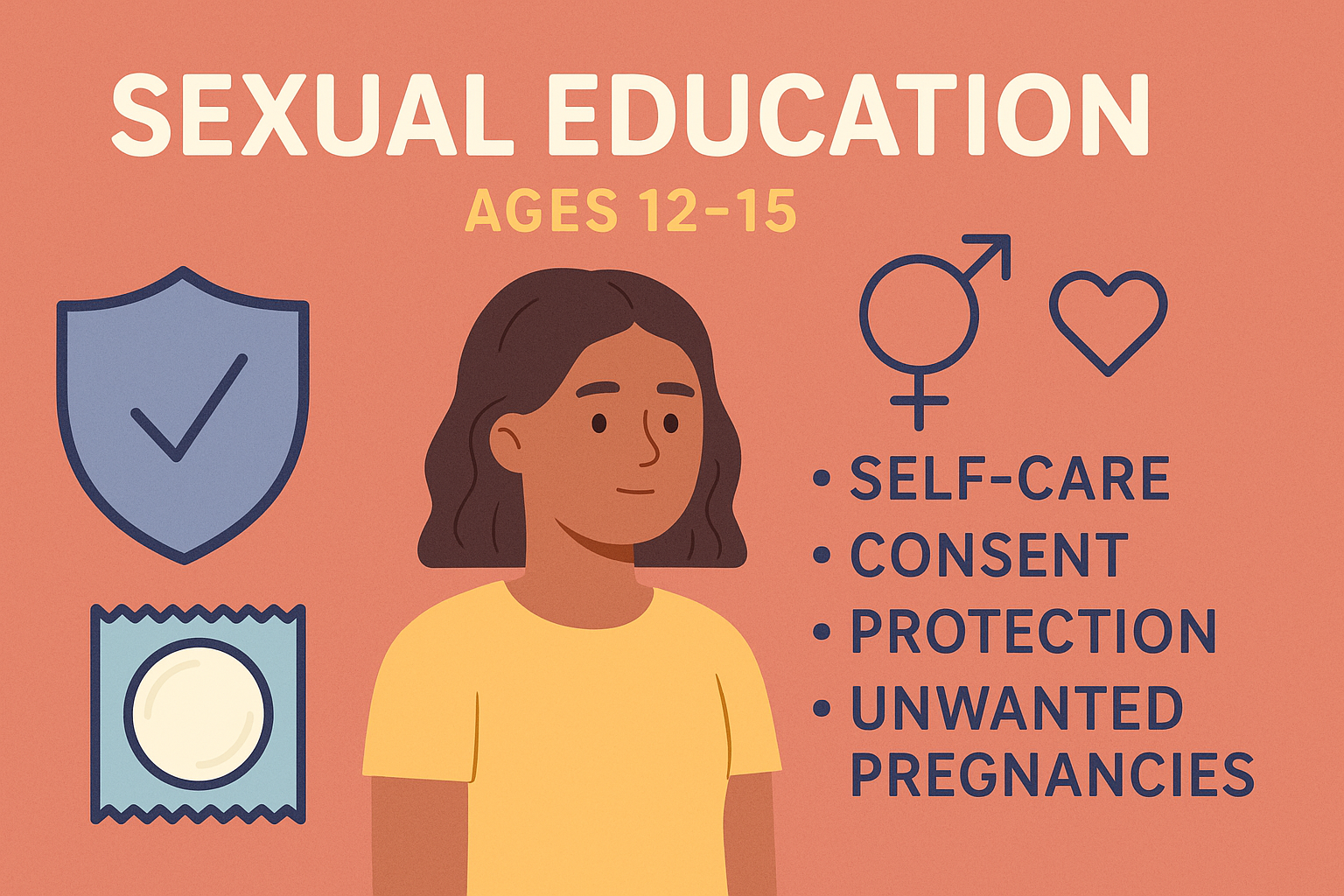Sexual education during early adolescence is critical for developing healthy attitudes, responsible behavior, and the ability to make informed choices. Ages 12 to 15 mark the onset of puberty, emotional development, curiosity about relationships, and exposure to digital media — making open and age-appropriate sexual education more essential than ever.
🧠 Why Sexual Education Is Important at This Age
- Puberty begins between 9 and 14 in most children.
- Adolescents start to explore identity, body image, and emotional intimacy.
- Misinformation from peers or online sources can lead to risky behavior or guilt.
- It encourages respect for self and others, helps prevent abuse, and reduces unintended pregnancies and STIs.
📌 Core Topics to Cover in Sexual Education
1.
Understanding Puberty and Physical Changes
- Hormonal changes, growth spurts, menstruation, and ejaculation
- Body hair, acne, mood swings
- Emphasize that changes are normal and unique to each child
2.
Emotional and Psychological Development
- Attraction, crushes, confusion, insecurity
- Managing peer pressure and emotions
- Teaching boundaries and emotional intelligence
3.
Consent and Respect
- Understanding bodily autonomy
- Clear communication: “No means no”
- Respecting others’ space and emotions
4.
Digital Safety and Pornography
- Dangers of pornographic content and sexting
- Privacy in online communication and social media
- Understanding that porn is not real sex education
5.
Sexual Orientation and Gender Identity
- Inclusivity: It’s okay to be curious or confused
- Respecting differences in others
- Avoiding bullying and prejudice
✅
What Children Should Learn to Do
✔ Practice Self-Care
- Good hygiene during puberty (washing genitals, using clean sanitary products)
- Managing acne and body odor
- Understanding and tracking menstrual cycles
✔ Speak Openly to Trusted Adults
- Encourage questions without shame
- Talk to parents, school counselors, or doctors when confused or uncomfortable
✔ Recognize Unsafe Touch
- Teach the concept of “safe vs. unsafe” or “good touch vs. bad touch”
- Always report inappropriate behavior to a trusted adult
✔ Know About Protection (When Appropriate)
- While early sex is not recommended, children should be aware of:
- Condoms (prevent pregnancy and STIs)
- Emergency contraception (in case of sexual assault)
- Understanding that protection is not just for pregnancy, but also for disease prevention
❌
What to Avoid
❌ Early Sexual Activity
- Engaging in sex too early can lead to:
- Emotional trauma
- Unwanted pregnancies
- Exposure to Sexually Transmitted Infections (STIs)
❌ Misinformation from Peers or the Internet
- Peer pressure or curiosity can lead to:
- Unsafe experimentation
- Unrealistic expectations from pornography
❌ Unsafe Digital Behavior
- Sexting and sharing intimate images can:
- Become a legal issue (child pornography laws)
- Cause mental distress and harassment
🚨
Risks of Early Active Sex Life
➤
Unwanted Pregnancies
- Adolescents are often unprepared emotionally and financially for parenthood
- Can lead to school dropouts, mental health issues, and social stigma
➤
Sexually Transmitted Infections (STIs)
- STIs like HPV, chlamydia, and HIV can be contracted through unprotected sex
- Often asymptomatic, yet dangerous if untreated
➤
Mental Health Struggles
- Guilt, anxiety, or depression from unprepared intimacy
- Emotional imbalance and long-term regret
🛡️
Creating a Safe and Supportive Environment
🌼 For Parents & Guardians
- Maintain open communication
- Avoid shaming; instead, educate
- Monitor online activity subtly but respectfully
- Introduce age-appropriate books or trusted resources
🏫 For Schools
- Introduce comprehensive sexuality education (CSE) as part of the curriculum
- Focus on consent, self-care, peer respect, and health
- Appoint trained counselors for adolescent health discussions
📘 Age-Appropriate Learning Resources
- Books: “It’s Perfectly Normal” by Robie H. Harris, “Sex is a Funny Word” by Cory Silverberg
- Websites: Amaze.org, Planned Parenthood (Teen Section), KidsHealth.org
- Apps: Period and mood trackers (e.g., Clue, Flo – with parental guidance)
❤️ Final Words
Sexual education is not about encouraging early sex — it is about equipping children with knowledge to protect their health, make respectful choices, and value themselves and others. Between 12 and 15, they are not yet adults, but they’re also not children in the traditional sense. The guidance they receive now can shape their future relationships, self-worth, and safety.

